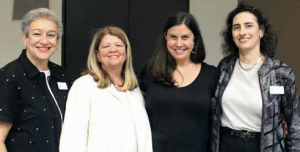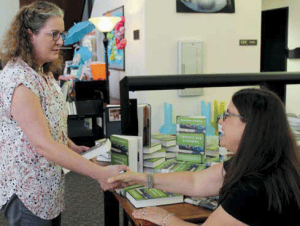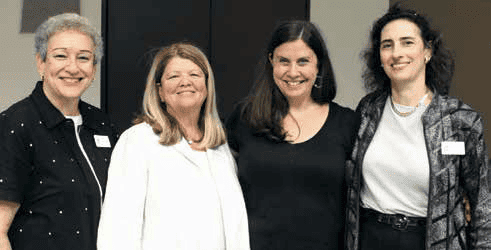 The Holocaust Commission of the United Jewish Federation of Tidewater held its Educators’ Conference, Words Matter: Now More Than Ever, July 26–27. For the 13th Biennial offering, chairs Gail Flax and Ina Leiderman could not have been more thrilled with the results.
The Holocaust Commission of the United Jewish Federation of Tidewater held its Educators’ Conference, Words Matter: Now More Than Ever, July 26–27. For the 13th Biennial offering, chairs Gail Flax and Ina Leiderman could not have been more thrilled with the results.
With word of mouth spreading from previous attendees, and endorsements from the Virginia Center for Inclusive Communities, the Virginia Conference of Social Studies Educators, and community and commission members— representatives from 34 different schools learned lessons about the Holocaust and best practices for teaching them.
The conference reached its level of success through the funds made possible by the Sam and Reba Sandler Foundation.
In addition to inviting educators, administrators, and student advocates, this year’s conference was also open to community members. Two options were offered for non-educators: morning keynote presentations only, held July 26 at Norfolk Academy, or the full two-day conference, which included afternoon workshops following the presentations, and a trip to the Virginia Holocaust Museum on July 27, with special presentations and workshops.
Of the 100 people registered for the conference, more than one-third were from the greater community. Follow-up surveys affirmed that all who attended appreciated the opportunity to do so; educators and non-educators alike commented that the conference provided insightful perspectives that they could use in a variety of situations, as well as in their everyday lives.
Keynote presenters at Norfolk Academy included Alexandra Zapruder, author of Salvaged Pages: Young Writers Diaries of the Holocaust, and Dr. Bernd Wollschlaeger, author of A German Life.
Wollschlaeger first addressed the packed house in the Landmark Room of Norfolk Academy’s Batten Library. The world’s greatest novelist could not have invented a plot as unbelievable as Dr. Wollschlaeger’s life. Born in 1958 in Bamberg, Germany, he knew as a child that his father was a war hero. His mother, a devout Catholic, raised him in the church. They rented an apartment in the home of Nina Von Stauffenberg, widow of the Nazi officer who enacted a failed assassination attempt on Adolf Hitler. His father did not want his son speaking to her, calling the portrait in her home “Traitor.” Young Bernd could not understand why someone who dressed in the same uniform as his father did when he gathered with his old war buddies could be a traitor if his father was a hero.
 Like all German students, he learned that while his country lost World War II , Nazi leaders were “normal people.” As he got older, he asked his father about the war. His alcoholic father did not want to talk much. After the German embarrassment at the slaughter of the Israeli athletes at the 1972 Munich Olympics, his father would rant about, “The Jews! Again!” Eventually it became apparent to the boy that his father was an unrepentant Nazi, to whom “Jews were unworthy people, lower than dogs.” The son eventually repudiated the father, becoming a Shabbos goy in a small Jewish community. When Christmas Eve fell on Shabbat one year, and he chose the Jewish community over his parents’ home, his father threw him out.
Like all German students, he learned that while his country lost World War II , Nazi leaders were “normal people.” As he got older, he asked his father about the war. His alcoholic father did not want to talk much. After the German embarrassment at the slaughter of the Israeli athletes at the 1972 Munich Olympics, his father would rant about, “The Jews! Again!” Eventually it became apparent to the boy that his father was an unrepentant Nazi, to whom “Jews were unworthy people, lower than dogs.” The son eventually repudiated the father, becoming a Shabbos goy in a small Jewish community. When Christmas Eve fell on Shabbat one year, and he chose the Jewish community over his parents’ home, his father threw him out.
With the help of the elders of “his” Jewish community, Wollschlaeger eventually converted to Judaism and made Aliyah to Israel. It is ironic that his great grandfather fought for Germany in the Franco Prussian War, his grandfather fought for the Kaiser in World War I, and his father fought for Hitler in World War II , and he became a medical officer in the IDF.
He did not speak about his life until his own children began asking about their grandparents, and so he worked to bring the story to them. He now shares his story because he knows firsthand about the divisiveness of hatred. Dr. Ludwig Sternlicht, survivor of the Warsaw Ghetto and community member in attendance, asked Wollschlaeger about the current feelings of Germans about their country’s Nazi past. Wollschlaeger responded that while there was a numbness immediately following the war, his generation, as exhibited by Angela Merkel, is learning history and applying it to the present. This is what he believes is behind her policy on Syrian refugees. Wollschlaeger says he speaks to help convince others to always work for good.
After Dr. Wollschlaeger’s powerful presentation, Zapruder brought the crowd into the world of young diarists of the Holocaust. After joining the founding staff of the US Holocaust Memorial Museum fresh out of college as a researcher, Zapruder found herself researching the life of children in the Holocaust through the museum’s growing collection of children’s diaries. With no context but having read Anne Frank’s diary in school, she wondered about the relationship between those diaries she was researching and Anne’s. She saw stark differences in the cultural construct of Anne’s diary, as a document “finding hope,” and “believing in the good in humanity,” and the pain, starvation, anguish, and other emotions on the diaries of many children and teens living under different circumstances. Ten years and more than 60 diaries later, Salvaged Pages was published. It won the Jewish Book Award in 2002.
Educators contacted her and asked for help in how they should use the primary source documents in the classroom. It has been adapted into a film for MTV and the second edition published in 2015, along with collateral materials for the classroom were developed by Zapruder and Facing History and Ourselves.
Participants had a chance to chat with the speakers and have them sign books over boxed lunches from Baker’s Crust. The afternoon brought a powerful interactive presentation from the Virginia Center for Inclusive Communities on exploring the roots of Prejudice and Bias. Facilitators Charm Bullard and Alex Cena discussed strategies to help make children in their classes more aware of bullying behaviors, and gave them ideas on how to turn these around. World History teacher Darryl Eley from Churchland High School said he felt he came away with some concrete classroom management ideas to improve classroom life.
In her afternoon workshop, Zapruder dug deep with the assembled educators to pull as much information as possible out of several diary entries, showing them how to use real history and see how it trickles down to the individual level. Betsy Karotkin, past Holocaust Commission director and chair, says, “Alex taught us all how to truly examine a firsthand account to get at the meaning of words and what they reveal about that time, which often gets lost in historical records.”
The next day, the group boarded a bus to visit the Virginia Holocaust Museum. After viewing some of the Holocaust Commission’s What We Carry films on the ride northwest, they were met and welcomed by Marcus Weinstein, board chairman. Then, Dr. Charles Sydnor, former director of the Virginia Holocaust Museum and now its senior historian, gave the day’s keynote address on Creating the Language of Genocide— How the Nazis Described the Holocaust. His encyclopedic knowledge and depth of understanding wowed the teachers. Sydnor, 74, spoke almost an hour and a quarter without any notes and gave a mini tutorial on how words can be used even more effectively than actions at times and not for good. After his talk, the conference attendees took a self-tour of the new Auschwitz exhibit and after another lunch from Baker’s Crust in Richmond, docent led tours of the museum were given.
On the ride back to Tidewater, everyone agreed that it could not have been a better way to end the conference. The teachers hoped to use all they had learned to teach their students about hate, bullying, diversity, and standing up for those who cannot stand up for themselves.
For more information about the Holocaust Commission, visit www. holocaustcommission.org, call 965-6125, or email info@holocaustcommission.org.

